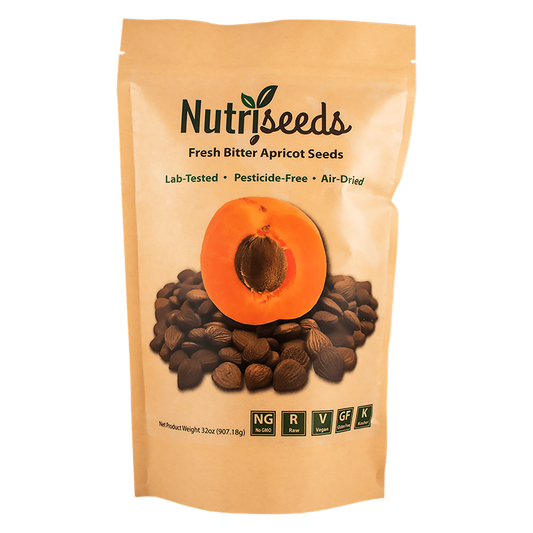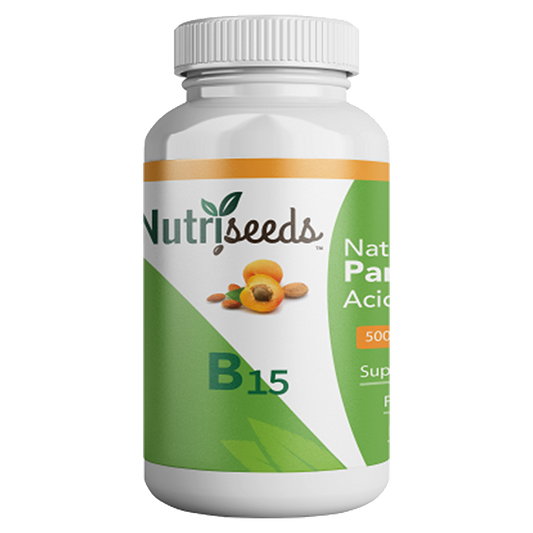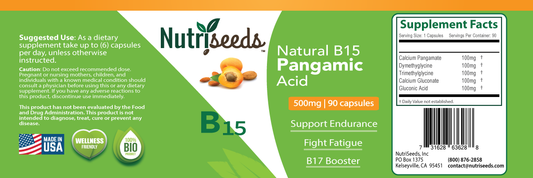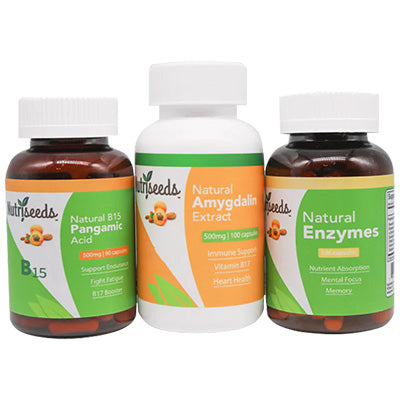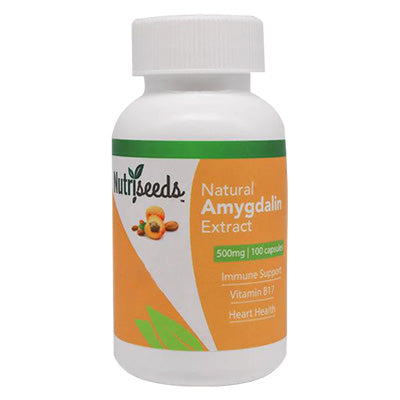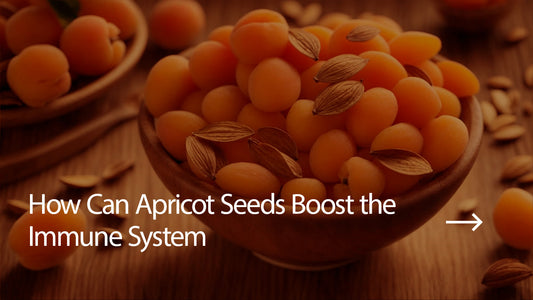
How Can Apricot Seeds Boost the Immune System
Apricot seeds, often overshadowed by the succulence of the fruit they nestle within, harbor a surprising wealth of immune-boosting elements.
Rich in vitamins, minerals, and particularly amygdalin - a compound with a controversial reputation - these seeds have sparked a debate within the scientific community regarding their potential health benefits and risks.
Proponents argue for their ability to fortify the body's defenses, while detractors caution against potential toxicity.
As we unravel the nutritional tapestry of apricot seeds, the discussion around their correct consumption becomes ever more pertinent.
Keep reading to explore the delicate balance between harnessing their immune-boosting power and navigating the associated risks.
Table of Contents
- Key Takeaways
- Discovering the Immune Boost in Apricot Seeds
- What Makes Apricot Seeds a Superfood
- Key Vitamins and Minerals in Apricot Seeds
- The Science Behind the Immune Support
- Nutritional Profile of Apricot Seeds
- Decoding the Nutrient Composition
- How Amygdalin Influences Immunity
- Antioxidant Properties of Apricot Seeds
- The Right Way to Consume Apricot Seeds
- Daily Recommended Intake for Optimal Health
- Methods to Prepare and Consume Apricot Seeds Safely
- Pairing Apricot Seeds With Other Foods for Enhanced Benefit
- Potential Health Benefits Beyond Immunity
- Apricot Seeds in Cancer Prevention: A Closer Look
- Positive Effects on Heart Health and Cholesterol Levels
- The Role of Apricot Seeds in Digestive Health
- Addressing the Controversies: Safety and Risks
- Understanding the Cyanide Concerns
- How to Minimize Risks While Maximizing Benefits
- Expert Opinions on Safe Consumption Levels
- Integrating Apricot Seeds Into Your Diet for Immune Health
- Simple and Delicious Recipe Ideas
- When to Expect Results From Regular Consumption
- Tracking the Impact on Your Immune Health
- What do apricot seeds do for the body?
- A Source of Nourishing Oil
- Skin Health and Vitamin A
- Protein Powerhouse
- Liver Love
- Glycoside and Blood Health
- Moderation and Safe Doses
- A Versatile Vegetable
- In Vitro Studies and Future Research
- Frequently Asked Questions
- What makes apricot seeds a powerful source of immune-boosting properties?
- How can the nutritional profile of apricot seeds contribute to overall health and well-being?
- What is the correct way to incorporate apricot seeds into one's diet for maximum benefits?
- Apart from immunity, what other potential health advantages can apricot seeds offer?
- How can individuals address safety concerns and understand the risks associated with consuming apricot seeds?
- Conclusion
Key Takeaways
- Apricot Seeds Contain Amygdalin (Vitamin B17), Which Has Been Linked to Potential Cancer Prevention and Immune System Support
- The Antioxidants, Vitamins, and Dietary Fiber in Apricot Seeds Support Overall Health, Especially in Combating Oxidative Stress and Inflammation
- Understanding Safe Consumption Practices, Including Dosage Control and Preparation Methods, Is Crucial Due to the Risk of Cyanide Poisoning From Amygdalin
- Pairing Apricot Seeds With Other Nutritious Foods Can Enhance Their Immune-Boosting Benefits and Improve Dietary Health
- Continuous Monitoring and Consulting With Healthcare Providers Are Essential to Safely Incorporate Apricot Seeds Into a Diet and Gauge Their Health Benefits
Discovering the Immune Boost in Apricot Seeds
In the quest for natural ways to enhance the body's defense mechanisms against diseases, apricot seeds emerge as a potent superfood, deserving a closer look.
These small but mighty kernels, hidden within the stone of the Prunus armeniaca fruit, are more than just a snack; they are packed with essential nutrients, including vitamins, minerals, and antioxidants, that play a crucial role in supporting the immune system.
Understanding what makes apricot seeds a superfood involves delving into the key vitamins and minerals they contain, such as vitamin B17, also known as amygdalin or laetrile, which has been linked to cancer prevention properties in alternative medicine.
Furthermore, the science behind how these nutrients support immune health reveals a fascinating interplay between diet and the body's ability to fight off illness.
This subsection aims to unpack these components, providing a foundation for appreciating the immune-boosting power of apricot seeds.

What Makes Apricot Seeds a Superfood
At the core of apricot seeds' reputation as a superfood are their high levels of vitamins and minerals that bolster the immune system. Among these, Vitamin B17 stands out for its controversial yet notable role in alternative health circles, believed by some to have cancer-fighting properties.
|
Nutrient |
Benefit |
|
Vitamin B17 (Amygdalin) |
Associated with cancer prevention efforts in alternative medicine. |
|
Antioxidants |
Combat oxidative stress and reduce inflammation, helping to prevent chronic diseases. |
|
Vitamins and Minerals |
Essential for optimal functioning of the immune system. |
|
Dietary Fiber |
Supports digestion and nutrient absorption. |
|
Fatty Acids |
Promotes heart health and maintains healthy cholesterol levels. |
Moreover, the antioxidants present in apricot seeds, such as vitamin C and E, offer further support to the immune system by combating oxidative stress and minimizing inflammation. This dual action of vitamins and antioxidants makes apricot seeds an invaluable addition to a health-conscious diet.
Key Vitamins and Minerals in Apricot Seeds
Apricot seeds house a treasure trove of nutrients essential for reinforcing the immune system, among which vitamin B17, or amygdalin, receives notable attention. This compound, found uniquely in the seeds of the Prunus armeniaca, has garnered interest for its potential in cancer prevention, spotlighting apricot seeds in discussions of natural health remedies.
In addition to amygdalin, apricot seeds are rich in antioxidants, including vitamins C and E, which play pivotal roles in safeguarding the body against oxidative damage and inflammation. These antioxidants contribute to the seeds' ability to bolster the immune system, making them a powerful ally in the maintenance of overall health.
The Science Behind the Immune Support
The interplay between apricot seeds and the human immune system is grounded in the biochemical processes that occur at the cellular level. When ingested, the nutrients and compounds in these seeds, especially amygdalin, interact with the body's cells to modulate immune responses, enhancing the body’s resilience against various pathogens.
Research into amygdalin’s impact on health has sparked interest in its potential to stimulate the body's defense mechanisms. Although the exact pathways of this stimulation are complex and still under investigation, scientists theorize that the antioxidant properties of apricot seeds could reduce cellular damage and inflammation, thus providing a more conducive environment for the immune system to operate effectively.
Nutritional Profile of Apricot Seeds
Peering into the heart of apricot seeds reveals an impressive array of nutrients, key among them amygdalin, that offers a novel approach to bolstering immunity.
This subsection delves into the intricate nutritional makeup of these seeds, exploring how the combination of amygdalin, antioxidants, and other vital components equips the body to mount a stronger defense against infections and diseases.
The exploration into amygdalin's role in immunity unveils its complex interaction with the body's cells, potentially offering a pathway to enhanced immune responses.

Equally, the antioxidant properties within apricot seeds merit attention for their capacity to ward off cellular damage and reduce inflammation, showcasing these seeds as a formidable ally in the pursuit of optimal health.
Decoding the Nutrient Composition
Decoding the nutrient composition of apricot seeds reveals a dense concentration of ingredients pivotal for health and well-being: Among them, amygdalin, known as vitamin B17, plays a starring role due to its much-discussed potential in cancer prevention and immune system support. Additionally, the fatty acids present, notably oleic and linoleic acids, are critical for cardiovascular health and maintaining balanced cholesterol levels.
The presence of dietary fiber in apricot seeds contributes significantly to digestive health, facilitating efficient nutrient absorption and regular bowel movements. This aspect is crucial for the overall functioning of the immune system, ensuring the body is well-equipped to ward off illnesses:
- Amygdalin (Vitamin B17) targets cancer prevention and boosts immune function.
- Oleic and linoleic acids promote heart health and regulate cholesterol.
- Dietary fiber supports digestion and enhances nutrient uptake.
Moreover, the antioxidant content, including vitamins C and E, shields cells from oxidative stress and inflammation, providing a dual mechanism of action for immune support and disease prevention. This intricate web of nutrients establishes apricot seeds as a formidable ally in nutritional health, deserving of recognition in diet and wellness circles.
How Amygdalin Influences Immunity
Amygdalin, a compound found in apricot seeds, plays a significant role in immune regulation by engaging with the body's biochemical pathways. Its potential anti-cancer properties have spurred interest in its application for boosting the immune system's ability to combat not only cancerous cells but also other diseases.
Upon ingestion, amygdalin is metabolized into cyanide, a process that has sparked much debate regarding its safety and efficacy. While this mechanism can pose risks, it also underlines the compound’s capacity to impact cellular processes significantly. Critics and proponents alike scrutinize its role in immunity, keen on understanding how it might be harnessed without causing harm:
- The metabolism of amygdalin releases compounds that could potentially target and eliminate harmful cells.
- Research continues to explore the balance between amygdalin’s benefits in boosting immunity and the inherent risks tied to its toxicity.
Antioxidant Properties of Apricot Seeds
The unique nutrient composition of apricot seeds includes a potent mix of antioxidants, vital for combating the detrimental effects of free radicals on the body's cells. These antioxidants, particularly vitamins C and E, play an essential role in reducing oxidative stress and thus, protecting the immune system's integrity and functionality.
By neutralizing harmful radicals, the antioxidant content within apricot seeds acts as a shield against cellular damage and inflammation. This protective mechanism is crucial in preventing the onset of chronic diseases and promoting overall health and wellness:
|
Antioxidant |
Function |
|
Vitamin C |
Reduces oxidative stress, supports immune defense. |
|
Vitamin E |
Protects cell membranes, combats free radicals. |
The Right Way to Consume Apricot Seeds
Embarking on the journey to incorporate apricot seeds into one's diet requires understanding not only the potential health benefits but also the importance of moderation and preparation to unlock their immune-boosting power fully.
Navigating the landscape of daily recommended intake ensures individuals can reap optimal health benefits without encountering the risks associated with overconsumption.
Additionally, discovering safe and effective methods to prepare and consume these nutritious kernels can enhance their efficacy and palatability.
Pairing apricot seeds with complementary foods further amplifies their nutritional value, creating synergistic effects that bolster overall health.

This section aims to guide through these crucial steps, ensuring a safe, enjoyable, and health-promoting experience with apricot seeds.
Daily Recommended Intake for Optimal Health
Establishing the daily recommended intake of apricot seeds is vital for harnessing their health benefits while mitigating risks. Health experts suggest moderation, typically advising no more than three to five apricot kernels per day for adults, to avoid potential toxicity from amygdalin conversion to cyanide.
Consultation with a healthcare provider becomes essential when considering apricot seeds as a supplement to support immune function and overall health. This ensures individuals tailor their intake according to specific health conditions and dietary needs, optimizing the immune-boosting benefits of apricot seeds safely.
Methods to Prepare and Consume Apricot Seeds Safely
Safely integrating apricot seeds into one's diet begins with appropriate preparation methods that reduce potential risks without compromising their nutritional benefits. Gently crushing or grinding the seeds before consumption can aid in breaking down their tough exterior, making them easier to digest and allowing the body to access the nutrients more efficiently.
Another method involves soaking the apricot seeds in water overnight. This step not only softens the seeds for easier consumption but also helps to reduce the levels of harmful substances they may contain, thereby minimizing the risk of adverse effects while maintaining their immune-boosting properties.
Pairing Apricot Seeds With Other Foods for Enhanced Benefit
Combining apricot seeds with a variety of foods not only enhances their palatability but also increases their nutritional value. For instance, blending crushed apricot seeds into smoothies with citrus fruits like oranges can amplify vitamin C intake, thus boosting antioxidant properties and immune function. This synergy between the vitamin-rich fruits and the amygdalin from the seeds creates a potent mix for promoting health and wellness.
Incorporating apricot seeds into whole grain dishes, such as oatmeal or quinoa salads, benefits the body by providing a rich fiber source. This assists in the efficient absorption of the seeds’ nutrients, supporting digestion and further enhancing the immune system. Through such thoughtful pairings, the nutritional profile of apricot seeds is elevated, contributing significantly to a balanced, health-focused diet.
Potential Health Benefits Beyond Immunity
Exploring the multifaceted benefits of apricot seeds extends far beyond their role in boosting the immune system.
These kernels harbor intriguing potential in several health domains, prominently including the preventive measures against various forms of cancer.
Similarly, their influence over heart health and cholesterol levels cannot be understated, showcasing their versatility in contributing to cardiovascular wellness.
Digestive health also benefits from the inclusion of apricot seeds in one's diet, due to their rich dietary fiber content.
Each of these aspects underscores the broad spectrum of health advantages that apricot seeds are capable of offering, extending their value beyond mere immune support.

Apricot Seeds in Cancer Prevention: A Closer Look
The exploration of apricot seeds in the context of cancer prevention has unveiled promising insights, particularly regarding amygdalin, known as vitamin B17. This compound has been the focus of research for its reputed ability to target and weaken cancer cells, offering a glimmer of hope in the quest for alternative cancer therapies.
While the conversation around amygdalin's efficacy and safety continues, proponents argue that, when processed correctly, it could become a vital tool in the arsenal against cancer. The ongoing scientific inquiry into its mechanisms aims to demystify how this natural component might contribute to halting the progression of various cancer types, making apricot seeds a subject of intrigue and potential in oncology.
Positive Effects on Heart Health and Cholesterol Levels
The robust nutrient profile of apricot seeds plays a significant role in promoting cardiovascular health, particularly through the presence of oleic and linoleic fatty acids. These essential fatty acids are known for their ability to maintain balanced cholesterol levels, thereby reducing the risk of heart disease.
Moreover, the antioxidant components within apricot seeds, such as vitamins C and E, contribute to protecting the cardiovascular system from oxidative stress. This action helps to prevent the buildup of plaque in the arteries, which can lead to heart complications, highlighting the seeds' potential for supporting heart health.
The Role of Apricot Seeds in Digestive Health
Apricot seeds contribute to digestive health by providing a significant amount of dietary fiber. This crucial nutrient aids in the regulation of bowel movements, preventing constipation and promoting a healthy digestive tract.
The inclusion of apricot seeds in one's diet can also play a vital role in nutrient absorption. The fiber from these seeds supports the digestion process, ensuring that the body efficiently utilizes the vitamins, minerals, and other nutrients consumed through food:
|
Component |
Function |
|
Dietary Fiber |
Facilitates regular bowel movements and supports a healthy digestive system. |
|
Nutrient Absorption |
Enhances the body's ability to absorb essential nutrients from food. |
Addressing the Controversies: Safety and Risks
The discourse surrounding apricot seeds often gravitates towards the considerable benefits these kernels hold for immune health.
Yet, a parallel narrative that cannot be ignored is the potential safety concerns, primarily centered around the presence of amygdalin, which can release cyanide upon ingestion.
This section embarks on elucidating the nuances of cyanide concerns associated with apricot seeds, aiming to offer clarity on mitigating risks while still harnessing the health-promoting qualities of these seeds.
Drawing on expert insights, it delves into recommending safe consumption levels and practices, striking a balance between leveraging the nutritional advantages and ensuring safety.

Understanding the Cyanide Concerns
The dialogue surrounding apricot seeds often touches upon the cyanide content within amygdalin, raising concerns over potential toxicity. This compound, integral to the seeds' immune-boosting claims, can metabolize into cyanide, a known toxin, which has fueled debates on the safety of apricot seed consumption.
Understanding the balance between the health benefits and the risks associated with cyanide release is critical for consumers. Professionals in both nutrition and toxicology emphasize the importance of informed consumption, highlighting that knowledge and moderation are key to leveraging apricot seeds for their health properties while minimizing potential harm.
How to Minimize Risks While Maximizing Benefits
To minimize risks while capitalizing on the immune-boosting benefits of apricot seeds, consumers should first focus on dosage control. Understanding the safe quantity ranges paramount: adhering to recommendations of consuming no more than three to five kernels daily can prevent the toxic effects of cyanide while preserving the health advantages.
Another pivotal strategy involves processing apricot seeds safely before consumption: Techniques such as thorough washing, overnight soaking, or gentle roasting can significantly reduce the levels of harmful substances. By adopting these practices, individuals can enjoy the nutritional perks of apricot seeds without incurring the associated risks:
|
Strategy |
Description |
|
Dosage Control |
Limiting intake to 3-5 kernels daily to balance benefits and risks. |
|
Safe Processing |
Washing, soaking, or roasting seeds to reduce toxicity. |
Expert Opinions on Safe Consumption Levels
Concerning the optimal consumption levels of apricot seeds, professionals across nutrition and toxicology fields converge on a cautionary stance: moderation is key. A consensus points to limiting intake significantly below levels capable of inducing toxicity, suggesting a nuanced understanding of apricot seed components is essential for safe consumption.
This careful approach underlines the dialogue between the potential health benefits and the known risks associated with apricot seeds. The emphasis remains on adhering to consumption guidelines that prioritize safety while acknowledging the nutritional merits of these kernels:
- Consulting with healthcare providers to personalize intake levels based on individual health conditions and dietary needs.
- Staying informed on the latest research and recommendations regarding amygdalin and cyanide content in apricot seeds.
- Adopting safe preparation methods to minimize risk exposure from potential toxins.
Integrating Apricot Seeds Into Your Diet for Immune Health
Discovering the immune-boosting benefits of apricot seeds involves not just understanding their nutritional composition but also how to incorporate them into daily meals for holistic health.
This upcoming section provides a variety of simple and delightful recipe ideas that make integrating apricot seeds into your diet an enjoyable endeavor.
Additionally, it sheds light on the timeline for when one might begin to observe tangible benefits from regular consumption of these nutrient-dense kernels.
For those keen on monitoring the enhancements to their immune health, strategies for tracking progress and discerning the impact of apricot seeds on their overall wellbeing are also featured, offering a comprehensive guide to maximizing the potential of this superfood.

Simple and Delicious Recipe Ideas
Incorporating apricot seeds into smoothies presents an effortless yet impactful way to harness their immune-boosting attributes. Mixing these seeds with a blend of banana, spinach, and a splash of almond milk not only creates a nutrient-packed beverage but also enhances the body's defense mechanisms with a delicious twist.
Another innovative approach involves adding finely ground apricot seeds to homemade energy bars. Combing oats, honey, dried fruits, and a sprinkle of apricot seed powder results in a delectable snack that fuels the body while reinforcing immune health, perfect for on-the-go nourishment.
When to Expect Results From Regular Consumption
The timeline for witnessing the immune-boosting impacts of incorporating apricot seeds into the diet varies among individuals, primarily due to differences in metabolic rates, existing health conditions, and dietary habits. Typically, consistent and moderate consumption over a period of a few weeks to a couple of months may begin to reveal noticeable changes in one's immune health, including possible improvements in energy levels and a reduced frequency of common colds and infections.
It's important for individuals to maintain realistic expectations and recognize that apricot seeds are part of a broader health and nutrition strategy rather than a standalone solution. Observing the body's response over a sustained period, while also paying close attention to any adverse effects, allows for adjustments that maximize benefits. Consulting with healthcare professionals can provide personalized guidance tailored to one’s unique health profile.
Tracking the Impact on Your Immune Health
Adopting a systematic approach to monitor changes in immune health following the inclusion of apricot seeds in the diet enables individuals to discern their efficacy. This involves maintaining a health diary or using health-tracking apps to document daily intake of apricot seeds, any experienced changes in wellbeing, and incidences of illness or infection:
- Record daily apricot seed consumption, noting quantities and preparation methods.
- Monitor and document any noticeable changes in energy levels, frequency of common colds, and overall wellbeing.
- Track incidences of illness or infection over time to assess changes in immune strength.
By analyzing this data, individuals can gain insights into the impact of apricot seeds on their immune health, allowing for adjustments to optimize benefits. It's crucial to pair this self-monitoring with regular check-ins with a healthcare provider, who can offer professional insights and make necessary dietary recommendations based on observed outcomes and overall health goals.
What do apricot seeds do for the body?
Apricot seeds, often overshadowed by the lush sweetness of their fruit counterparts, hold a treasure trove of nutritional benefits that can contribute significantly to our health. Packed with oil, protein, vitamins, and a unique compound known as glycoside, these tiny kernels have been studied for their potential in supporting various bodily functions. Let's dive into how incorporating apricot seeds into your diet can benefit your skin, liver, blood, and overall well-being.
A Source of Nourishing Oil
Apricot seeds are rich in oil, particularly unsaturated fats, which are known for their heart-healthy benefits. The oil extracted from these seeds can also be used topically to moisturize and nourish the skin, making it a dual-purpose component of the apricot plant. This vegetable oil is light and easily absorbed, offering a natural alternative to commercial skin care products.
Skin Health and Vitamin A
Rich in Vitamin A, apricot seeds can play a crucial role in maintaining healthy skin. Vitamin A is essential for skin regeneration and helps to repair skin tissue, which can speed up the healing process of an injury. The topical application of apricot seed oil can help to improve skin elasticity, reduce signs of aging, and provide a protective barrier against environmental damage.
Protein Powerhouse
Apricot seeds are a good source of plant-based protein, essential for building and repairing tissues in the body. Protein is also crucial for immune system function, hormonal balance, and the maintenance of muscle mass. For those seeking alternative sources of protein, apricot seeds can be an excellent addition to a balanced diet.
Liver Love
The liver benefits from the detoxifying effects of certain compounds found in apricot seeds. In vitro studies suggest that the antioxidants present in apricot seeds may help protect the liver from oxidative stress and improve its ability to filter toxins from the blood. However, it's important to consume apricot seeds in moderation due to the presence of glycoside compounds.
Glycoside and Blood Health
Apricot seeds contain a type of glycoside known as amygdalin, which has been researched for its potential effects on blood health. Amygdalin can convert into cyanide in the body, a substance that, in very small doses, has been studied for its possible role in attacking cancer cells. However, due to the risks associated with cyanide, it's crucial to adhere to safe consumption practices and doses when it comes to apricot seeds.
Moderation and Safe Doses
While apricot seeds can offer numerous health benefits, it's essential to consume them in moderation. Due to the presence of amygdalin, excessive consumption can lead to cyanide poisoning. Always consult with a healthcare provider to determine a safe dose that fits your individual health profile.
A Versatile Vegetable
Though not a vegetable in the traditional sense, apricot seeds share many characteristics with vegetable sources of nutrients, such as being rich in vitamins, minerals, and plant-based compounds. They can be considered a part of the vegetable spectrum in terms of their nutritional profile and benefits.
In Vitro Studies and Future Research
Much of the research on apricot seeds, especially regarding their potential cancer-fighting properties, has been conducted in vitro, meaning in a laboratory setting outside of a living organism. While these studies are promising, more research, including clinical trials, is needed to fully understand the benefits and risks of apricot seeds.
Frequently Asked Questions
What makes apricot seeds a powerful source of immune-boosting properties?
Apricot seeds are hailed for their immune-boosting properties primarily because they are rich in vitamin B17, also known as amygdalin, which is thought to have potent antioxidant effects. Additionally, these seeds contain a mix of beneficial compounds including vitamins, minerals, and essential fatty acids that collectively support and enhance the body's immune response.
The nutritional makeup of apricot seeds is diverse, including vitamins E and A, which are known antioxidants that help combat oxidative stress, a key factor in immune system degradation. The presence of omega-3 and omega-6 fatty acids in these seeds further contributes to their health benefits, aiding in reducing inflammation and supporting cardiovascular and brain health.
Amygdalin, the component receiving much attention, has been studied for its potential in cancer therapy, though it's worth noting the controversies over its effectiveness and safety. This compound releases cyanide when metabolized, which has raised significant concerns regarding cyanide poisoning, making it paramount for consumers to be cautious about their intake levels. Despite this, some proponents of alternative medicine continue to advocate for the ingestion of apricot seeds, or its extract, as part of treatment regimens for cancer and other diseases, underscoring the necessity for further research and validation from the medical community.
Prunus armeniaca, the botanical name for the apricot tree, has not only given us the apricot fruit but also these intriguing seeds that have been used in various cultures for their purported therapeutic effects. Being a dietary fiber source, they also contribute to digestion and overall gut health, which is vital for maintaining a robust immune system.
In the realm of nutrition and health, apricot seeds emerge as a complex topic, interwoven with historical uses, nutritional benefits, and modern-day controversies. It is crucial for individuals considering them for therapeutic purposes to seek medical advice and rely on scientific evidence to guide their decisions, keeping in mind the importance of moderation and the potential risks associated with their consumption.
How can the nutritional profile of apricot seeds contribute to overall health and well-being?
The nutritional profile of apricot seeds, rich in vitamins, minerals, and essential fatty acids, plays a fundamental role in bolstering the immune system and reducing inflammation, thereby contributing to overall health and well-being. These seeds, nestled within the hard exterior of the apricot fruit, contain valuable nutrients such as vitamin E, iron, and oleic and linoleic acids, which collectively support body functions and protect against various diseases.
What is the correct way to incorporate apricot seeds into one's diet for maximum benefits?
Incorporating apricot seeds into one's diet should be approached with caution and knowledge, particularly consulting a healthcare professional for personalized advice. Typically, consuming small amounts, such as one to two seeds a day, mixed with other foods or taken alongside a meal, can help in mitigating potential risks while reaping the nutritional benefits.
Apart from immunity, what other potential health advantages can apricot seeds offer?
Apricot seeds, often regarded as tiny powerhouses of nutrients, potentially offer a myriad of health advantages beyond bolstering the immune system. Rich in vitamin B17, also known as amygdalin, these seeds are believed to play a role in reducing the risk of certain cancers and in managing inflammation, contributing significantly to overall health and wellness.
How can individuals address safety concerns and understand the risks associated with consuming apricot seeds?
To address safety concerns and understand the risks associated with consuming apricot seeds, individuals should prioritize acquiring information about the accurate dose and potential toxicity. Consulting with a healthcare professional and referencing reputable sources can provide clarity and guidance on consumption practices that minimize health risks.
Conclusion
Unlocking the immune-boosting power of apricot seeds presents a promising avenue for enhancing overall health and fortifying the body's defense mechanisms against diseases.
Rich in essential nutrients, including the controversial vitamin B17 (amygdalin), antioxidants, vitamins, minerals, dietary fiber, and fatty acids, apricot seeds offer a multi-faceted approach to bolstering immune health.
While amygdalin's potential anti-cancer properties spark interest in its immune regulation capabilities, it’s critical to navigate the balance between its benefits and the risks associated with cyanide production during metabolism.
Adopting safe consumption practices, such as dosage control and proper seed preparation, is paramount to minimize potential toxicity while maximizing health benefits.
Pairing apricot seeds with a variety of foods can enhance their nutritional value, contributing significantly to a balanced, health-focused diet.
Despite the ongoing debates surrounding safety and efficacy, apricot seeds, when consumed responsibly, emerge as a formidable ally in the quest for natural, dietary-based immune support, underscoring the importance of informed, moderated inclusion in one's diet for optimal health benefits


